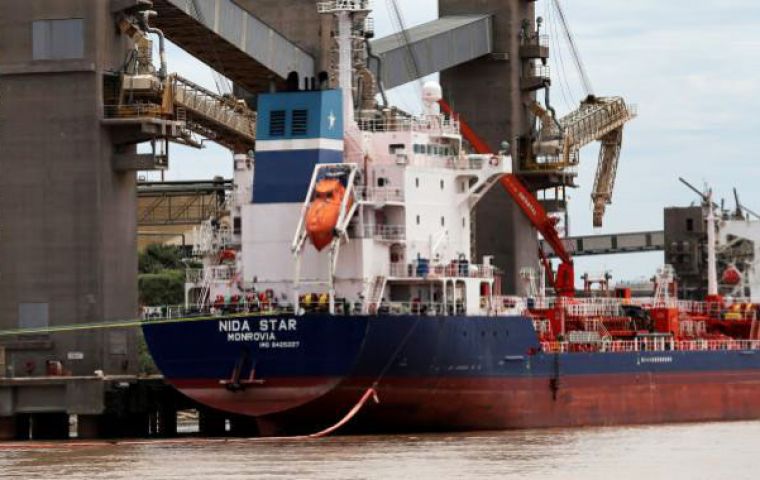MercoPress. South Atlantic News Agency
Port workers' strikes hinder Argentine exports of cereals
 Ports like Bahía Blanca could be an alternative, but labor disputes complicate the situation
Ports like Bahía Blanca could be an alternative, but labor disputes complicate the situation With most Argentine ports along the Paraná river unoperational due to the historic downspout, Quequén, Necochea, and Bahía Blanca on the Atlantic coast would have become an alternative way out for agri-food exports had it not been for union strikes.
Port workers as well as and self-convened lorry drivers paralyzed operations Friday in all three shipping gateways in the province of Buenos Aires, which were channeling more cargo than usual.
The Federation of Argentine Port Stevedores (FEPA), decided a 48-hour stoppage of activities Friday and Saturday, blocking both the loading of ships and in some terminals the reception and unloading of lorries.
FEPA leader Osvaldo Osores later announced the union had lifted the measure after the Ministry of Labor agreed to hold talks next Tuesday.
Nevertheless, the ports are still not operational due to blockades by a group of “Self-convened Truckers,” which means they do not have a formal union representation and subsequent leadership with whom authorities could negotiate.
In addition, the Single Union of Argentine Ports (SUPA) started a strike at Bahía Blanca “at least until Monday,” according to SUPA sources. Analysts were still skeptical Friday the situation would actually improve by Monday.
The three seaports were channeling all exports of corn, wheat and soybeans usually shipped through Rosario on the Parana river coast. The other Argentine ports down the Atlantic coast are not equipped to handle grain exports.
According to data from the Bahía Blanca port, in recent weeks there had been a 46% increase in the entry of trucks compared to the same period last year. And in the Necochea terminals, according to a report by “Williams Deliveries” quoted by the specialized publication Agrofy, the increase exceeded 100 percent.
This same afternoon, the Bahía Blanca Cereal Exchange pointed out that in the last two weeks 523,000 tons of corn had been shipped through the port of that town and that 583,000 tons had been announced for the next 2 weeks.
The downspout of the Paraná river had delayed shipping operations as well as increased freight costs, forcing ships to leave with less cargo from the ports in the Rosario at best, or shifting to other ports where cargos are reached by by truck.
In this scenario, the ports of southern Buenos Aires, and especially that of Bahía Blanca, gained importance: between May 3 and July 18, average loads per ship went from 21,500 to 26,300 tons, with peaks of 29,000, an increase in 22.5%, which resulted in an increase of 300,300 tons compared to the historical average and was key for the output of cereals, especially corn.
This time of the year is normally peak season for the port of Bahía Blanca, now hit for the better with the additional load of goods.
In soybeans there was also an increase from 23,000 to 24,400 average tons per ship. In the case of wheat, the Paraná downspout has had little impact because most of its output usually operates through Bahia Blanca and goes directly to Brazil.




Top Comments
Disclaimer & comment rulesCommenting for this story is now closed.
If you have a Facebook account, become a fan and comment on our Facebook Page!